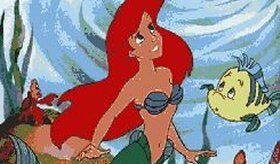
|
| |
| |
|
|
| Tookey's Review |
|
| Pro Reviews |
|
| Mixed Reviews |
|
| Anti Reviews |
|
| Cast |
|
| |
 |
| |
| Released: |
1989 |
| |
|
| Genre: |
MUSICAL
CARTOON
ROMANCE
FAMILY
|
| |
|
| Origin: |
US |
| |
|
| Length: |
83 |
|
| |
|
| |
|
|
| |
|
Mermaid princess longs to marry a landlubber.
|
Reviewed by Chris Tookey
|
|
|
| A fine cartoon - partly because the animation ranges from the cuteness of Bambi to the ferocity of Fantasia. Another reason is the characterisation: Ursula the Sea Witch is the most splendidly repulsive Disney villain since Cruella de Vil in 101 Dalmatians . Even the heroine's range of facial expression is enchanting: far superior, in fact, to the blandness of Snow White and The Sleeping Beauty. |
| Other important ingredients are a catchy, Oscar-winning score and witty lyrics. The songs may be Broadway pastiche, but they advance the action, enlarge character, and here inspire some of the best visual gags ever seen in a Disney cartoon - or any screen musical. |
| A few elements of Hans Andersen's fairytale have been lost. In the original, the little mermaid sacrifices her tongue to the Sea Witch in order to gain legs, only to lose out to a princess with no such social handicap. The little mermaid then nobly refuses to stab the prince, and thereby win back her old life. The prophecies of her father, the Sea-King, are proved true: she suffers agonies (every step she takes on dry land feels like treading on sharp knives); and she loses her lover, her family and her life. |
| In Disney's more upbeat version, the mermaid's teenage rebellion is crowned with success: she wins her prince and regains her voice - while her father learns not to stand in the way of young people's aspirations. The cartoon ends up, indeed, with the opposite message to Andersen's original: it is a homage to adolescent love, the "can-do" culture and upward mobility. But then different nations and generations have always reinterpreted fairytales to suit their prejudices. |
| In common with other Disneyfied fairytales, there's something odd to British ears about mediaeval princes talking with American accents; and there's plenty for any agonised liberal to question in the movie's value system. The film deals ebulliently in racial stereotypes and retains all the snobbery and sexism of Anderson's original (the little mermaid's one aim is to catch her prince). But it's easy to be humourless about such matters: this was Disney's best new full-length cartoon in 30 years, and paved the way for a new golden era of Disney animated musicals. |
|
|
|
|
|
|
|
